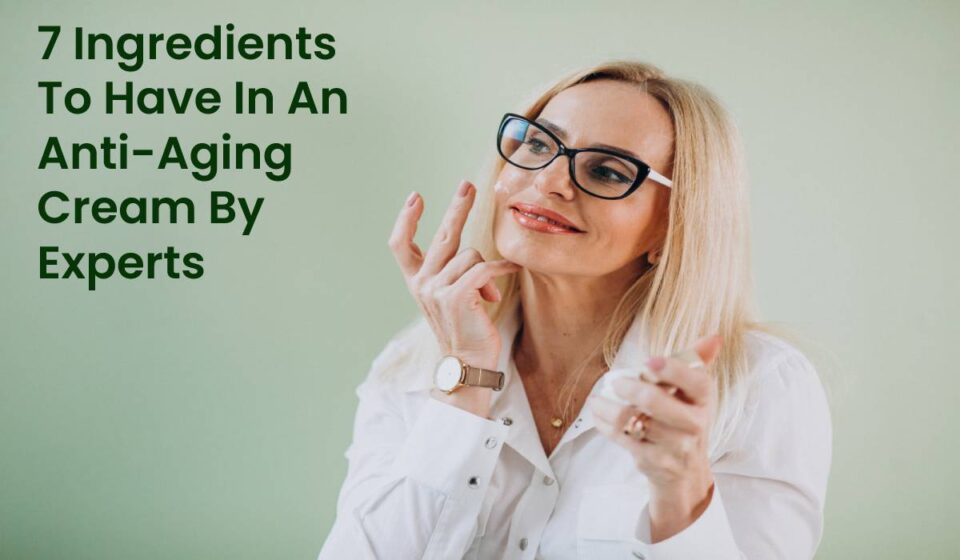Premature aging is a growing concern among many people in their 30s. It can get overwhelming and confusing to find the right product or cream for fighting with so many competitors in the market. All you need to do is get back to basics and scroll through the ingredients. That’s where the magic lies. When you have the knowledge, you can make the best choice depending on your skin. Picking a cream because it says it is anti-aging is not an intelligent choice to make. Hence, in this article, we will discuss seven essential ingredients to check in an anti-aging cream.
Table of Contents.
Also Read: Top Five Vitamins For Joints Functioning Healthy And Strong
Peptides Super Ingredient in Anti-Aging Cream
Did you know that peptides are a super ingredient to combat aging and repair your skin? Peptides are full of amino acids, a necessary protein that acts as building blocks for collagen in our body. After the age of thirty, the body starts losing 1% collagen every year. That’s where peptides come in. Oral application of peptides does not essentially increase collagen in the body. Instead, it gives a signal to the body to produce more collagen naturally. Nowadays, peptides are available online. You can find authentic at Lotilabs and be assured of the quality.
Also Read: wellhealthorganic.com:Skin care and Facial Exercises Anti Aging Fitness
Important ingredient SPF In Anti-Aging cream
Harmful UV rays are a leading cause of aging. With ozone-depleting and global warming increasing, the sun’s rays have become harsher on the skin. So, when you choose an anti-aging cream for your daytime routine, then it must have SPF in it. This will save you the hassle of layering sunscreen over your cream. Make sure that the SPF is more than 30 and is a broad spectrum. You will get protection from both UVA and UVB rays. Without SPF, the sun’s rays will break down the collagen and elastin in your skin, making it look dull.
Retinol
The new skincare buzzword is retinoids. They are a type of vitamin A and a leading ingredient in anti-aging products. You can consume foods with vitamin A such as sweet potato, broccoli, spinach, carrots, etc. But to use it, your body needs to break it and convert. To simplify the process, topical retinoids are preferred to heal the affected area as it speeds up cell turnover and sheds the dead skin faster. This can fight visible signs of aging, such as fine lines, dark spots, and wrinkles.
Ceramides
Our skin structure is made up of natural fats that retain moisture in the skin. With age, the skin starts losing ceramides. Applying a cream containing ceramides can make up for what is lost. The ability of the skin to retain moisture also gets affected as you lose these fats. And then signs of aging start to show up in the form of sagging skin and wrinkles. Hence, always look for an anti-aging cream or serum with a significant amount of ceramides for faster results. You can also use supplements to rebuild your skin.
Vitamin C Antioxidant Properties In Anti-Aging Cream
According to research, vitamin C can prevent your skin from free radical damage due to its excellent antioxidant properties. Regular use of vitamin C on the skin can significantly reduce visible dark spots. Be mindful of the packaging; it should be air-tight and opaque to prevent any sun damage. Also, the concentration of vitamin C should range between 5% to 20%. If you are new to vitamin C, start with a less concentrated solution and increase with time. Using it in higher concentrations can irritate the skin and cause redness.
Also Read: Essence Of Water And Easy Tricks To Drink More Water
Glycolic Acid
Physical exfoliants can cause damage to your skin’s pores. In contrast, chemical exfoliants such as glycolic acid work without any side effects. Glycolic acid is an alpha-hydroxy acid that is included in cleansers, exfoliating scrubs, toners, chemical peels, anti-aging creams, etc. Consult a dermatologist to know how much you need to use and what concentration is safe for you. Usually, the products vary from 5% to 10% in concentration. Glycolic acid reduces hyperpigmentation and the appearance of fine lines. Apart from procedures such as chemical peels, products contain mild forms of glycolic acid that can use daily.
Also Read: Best Big Brain Time Habits That Anyone Can Practice Right Away
Hyaluronic Acid in Anti-Aging Cream
Hyaluronic acid is a powerful humectant that can hold water 1000 times more than its weight. It works by pulling out moisture from the environment into your skin. There is no side effect of using it orally as your skin has it in its natural form. People with all skin types can use it daily to prevent skin from getting dry. It can make your skin look plump and youthful. But the effects only last till it is on your face. Hence, daily use is recommended.
Also Read: How To Take And Best Time To Take Ashwagandha
Conclusion
Your anti-aging cream must contain these powerful ingredients for effective results. Before making the purchase, always check the packaging and concentration. At the start, choose a cream with mildly potent ingredients and then increase the percentage.


